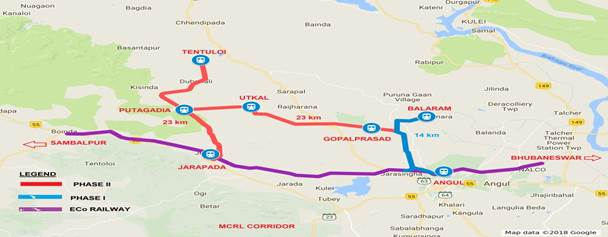By Our Correspondent
ANGUL/BHUBANESWAR: Talcher Coalfields of Mahanadi Coalfield is one of the largest with about 52 BT of coal resources, which is 15% of total prognosticated coal resources in the country. Of the available resources in Talcher Coalfield, more than 63 % (33 BT) lies within 300 m depth, presenting significant potential for open cast mining.
Talcher coalfields has produced more than 95 Million Tonne (MT) coal during FY22 and likely to produce about 200 MT in FY 2024-25 and about 300 by FY 2030 from Mahanadi Coalfields Limited and allocated coal blocks. To ensure efficient coal evacuation, construction of rail line started in a phased manner in Talcher Coalfields namely MCRL (Mahanadi Coal Railway Limited).
The Ministry of Coal has identified construction of MCRL Phase I & II project as high Impact project under PM Gatishakti. “Mahanadi Coal Railway Limited (MCRL)” was incorporated on 31.08.2015 with 64% share of Mahanadi Coalfield Limited (MCL), 26% of IRCON and 10% share of Industrial Development Corporation of Odisha (IDCO)
The Alignment of the project traverses through Angul district in Odisha. Angul and Jarapda are existing stations of Indian Railways network. Balram is existing loading station in Talcher –Balram private siding of MCL.
MCRL Phase-I (Angul-Balram) of 14 Km length is expected to be operationalized by this year. This railway line will cater to evacuation of 25 MT coal from MCL mines in Talcher Coalfields.
MCRL Phase-II (Balram-Jarpada-Tentuloi) of 54 Km is expected to be commissioned by Dec’2025. It provides connectivity to allocated coal blocks on the southern side and central part of Talcher Coalfields.
Phase-II is progressing rapidly, notification for Land acquisition and Forestry Clearances have been obtained. This railway line will cater to evacuation of coal from CIL & Non-CIL Coal Blocks in Talcher Coalfields ~58 MT.
Thus MCRL rail corridor will be a game changer in the evacuation of coal from Talcher coalfields. The rail corridor will improve faster movement of coal rakes to Paradip and Damra ports thereby decongesting rail network and this will also reduce transportation cost considerably. Shipping routes are much cheaper compared to rail network and improves coal availability in southern and western region of the country.



























